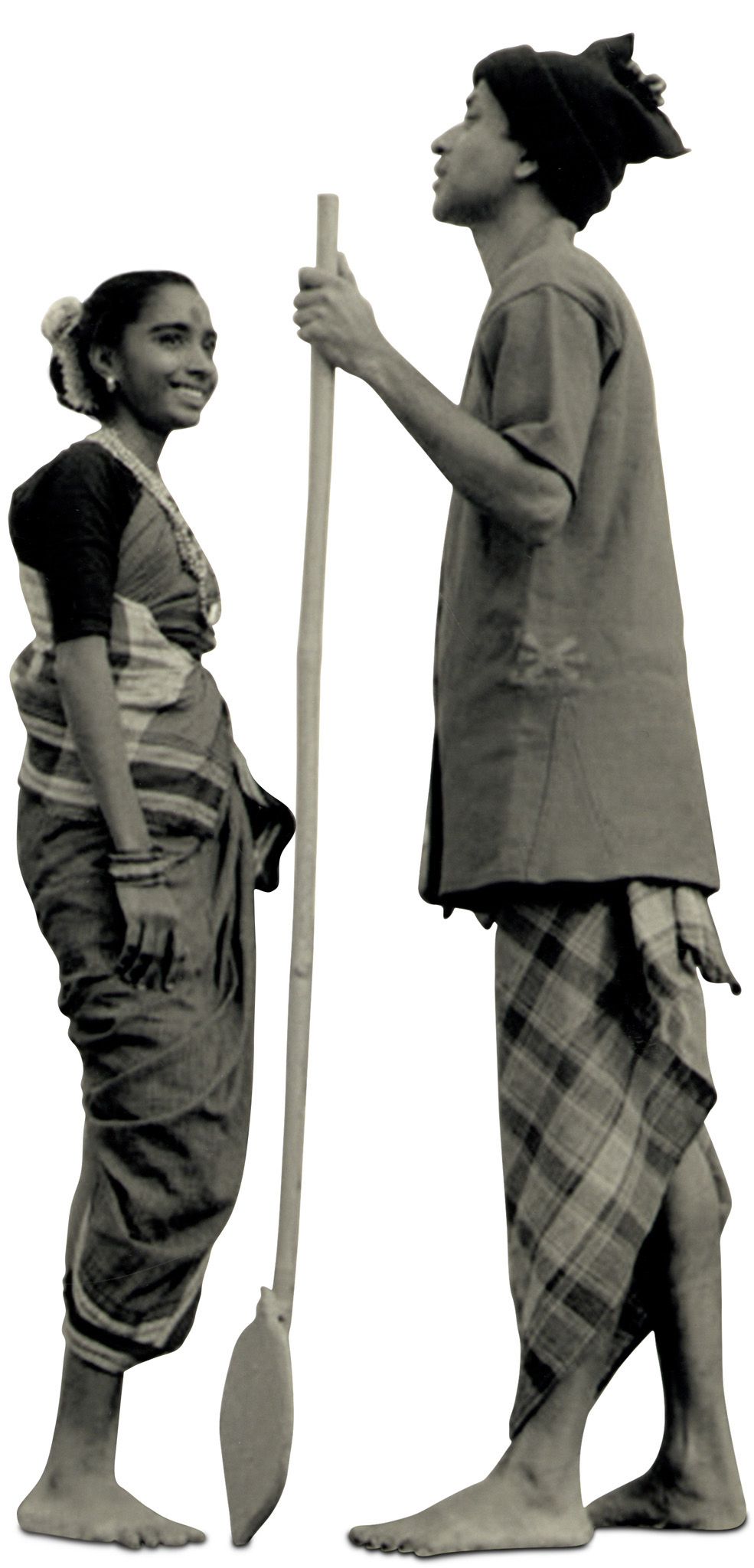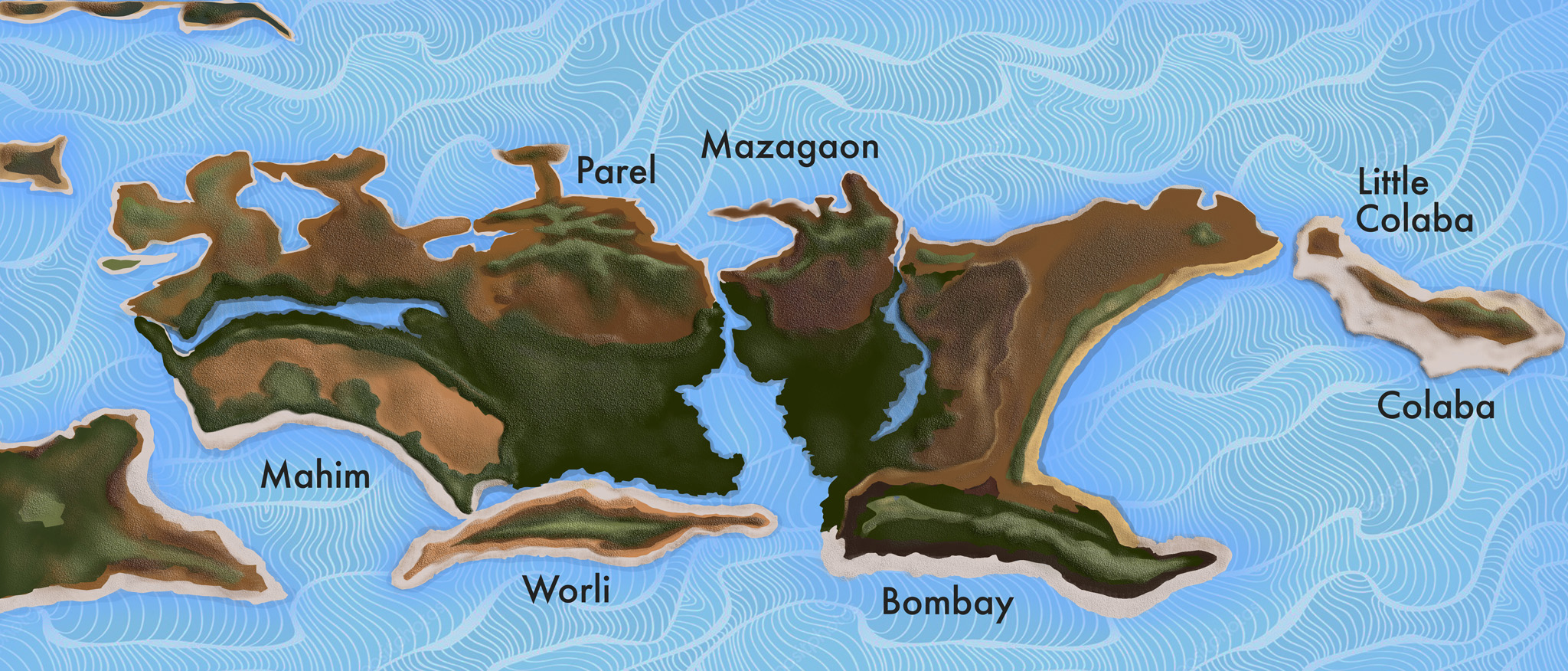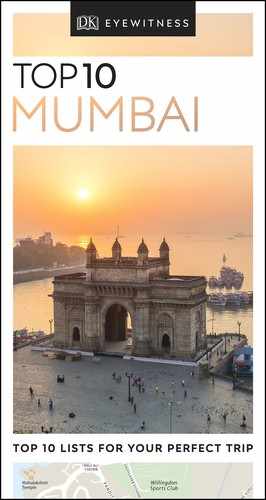MOMENTS IN HISTORY
1. Early Settlers: The Kolis
The Koli fishing community were the earliest known people to settle in present-day Mumbai, although the discovery of Paleolithic tools suggest that the area was inhabited much before that.

A Koli fisherwoman and fisherman
2. 16th and 17th centuries: Portuguese to British
Bombay came under the rule of the Gujarat Sultanate in the 14th century. A Portuguese attempt to capture the city failed in 1507, but in 1534, they were able to seize the islands from Bahadur Shah of Gujarat. The Portuguese crown ceded the isles, called Bom Bahia by then, to the East India Company in 1668 as part of the marriage settlement between King Charles II and Catherine of Braganza.
3. 1771–1784: Hornby Vellard Project
William Hornby became governor of the city and started a massive civil engineering project (Hornby Vellard Project) to connect all seven islands of Bombay, despite opposition from the East India Company. All of them were finally merged into one single mass by the year 1845.

Rendering of the seven islands of Bombay from 16th to mid-19th century
4. 1853: First Rail Network
Following the Hornby Vellard Project and the rapid industrialization that it triggered, the British started building a rail network (a first for the Asian subcontinent). The premier train ran between the CSMT terminal and the neighbouring Thane region in 1853, covering a total distance of around 33 km (21 miles). The current suburban (or local) railway system in the city is also an offshoot of this same network.
5. 1869: Opening of the Suez Canal
The Suez Canal opened in 1869, facilitating trade, especially cotton exports, between Bombay and Britain and continental Europe. This exchange contributed greatly to Bombay’s increasing prosperity and it soon established itself as one of the major ports in the country.
6. 1913: Foray into Films
Setting a historic benchmark for the Indian film industry in 1913, Dadasaheb Phalke directed and produced Raja Harishchandra. India’s first full-length feature film, it recounted the legend of Raja Harishchandra as told in the epics of Ramayana and Mahabharata. This silent film became a huge success, paving the way for commercial Indian cinema as we know it today.
7. 1960: Capital of Maharashtra
India gained its independence in August 1947, ending the 282-year-old British rule in Bombay. In 1960, after years of struggle by the Samyukta Maharashtra Movement, Maharashtra was carved out of the Bombay State, which included present-day Gujarat and Maharashtra. Bombay became the capital city of the state.
8. 1995: Bombay to Mumbai
In 1995, Shiv Sena came to power in the state by forming a coalition government with the Bharatiya Janata Party (BJP). Soon after, the city of Bombay was renamed to its native moniker Mumbai, in honour of the goddess Mumbadevi, the deity of the indigenous Koli people. In similar fashion other English names were dropped to assert regional identities.
9. City Under Siege
The cosmopolitan fabric of the city has been ruptured several times in recent years. Hundreds lost their lives in the 1992–3 riots that followed the demolition of the Babri Masjid. Later in the year, as a revenge attack for these riots, 12 coordinated bombs shocked Bombay. In July 2006, seven bombs exploded within 11 minutes on multiple local trains. The 26/11 attacks – the most recent in the city’s history – were a combination of bombs and bullets that lasted for four days.
10. 2011 Cricket World Cup
The 10th edition of the ICC Cricket World Cup proved to be lucky for the “Men in Blue” as they defeated Sri Lanka to lift the coveted trophy in front of thousands of cheering fans at the Wankhede Stadium in Mumbai. Amid wild celebrations by a billion supporters, the players dedicated their victory to the victims of the 26/11 attacks.
TOP 10 FAMOUS PERSONALITIES
1. Lata Mangeshkar
With a career that spans over seven decades, the popular playback singer is a recipient of the Bharat Ratna award.

Revered singer Lata Mangeshkar
2. Dadabhai Naoroji
The “Grand Old Man of India” was one of the founding fathers of the Indian National Congress and the first Asian MP in the British House of Commons.
3. Jamsetji Nusserwanji Tata
This celebrated industrialist is the founder of the Tata Group.
4. Nissim Ezekiel
Winner of the Sahitya Akademi Award, this poet, playwright, editor and art critic is a prominent figure in India’s postcolonial literary heritage.
5. Bal Thackeray
A public figure in his own right, the founder of the right-wing Shiv Sena began his career as a cartoonist.
6. Mukesh Ambani
The chairperson and managing director of Reliance India Limited lives in Antilia, one of the world’s most expensive homes and a minor tourist attraction.
7. Sachin Tendulkar
A former captain of the Indian cricket team, the “God of Cricket” is the highest run scorer in ODI and Test formats.
8. Medha Patkar
She is a social activist and the founder of the Narmada Bachao Andolan, a people’s movement spanning 32 years.
9. Jerry Pinto
This popular writer’s acclaimed debut novel, Em and The Big Hoom, won him a Sahitya Akademi Award.
10. Vijay Tendulkar
One of the most eminent modern Indian playwrights, he became a social commentator through his plays.
